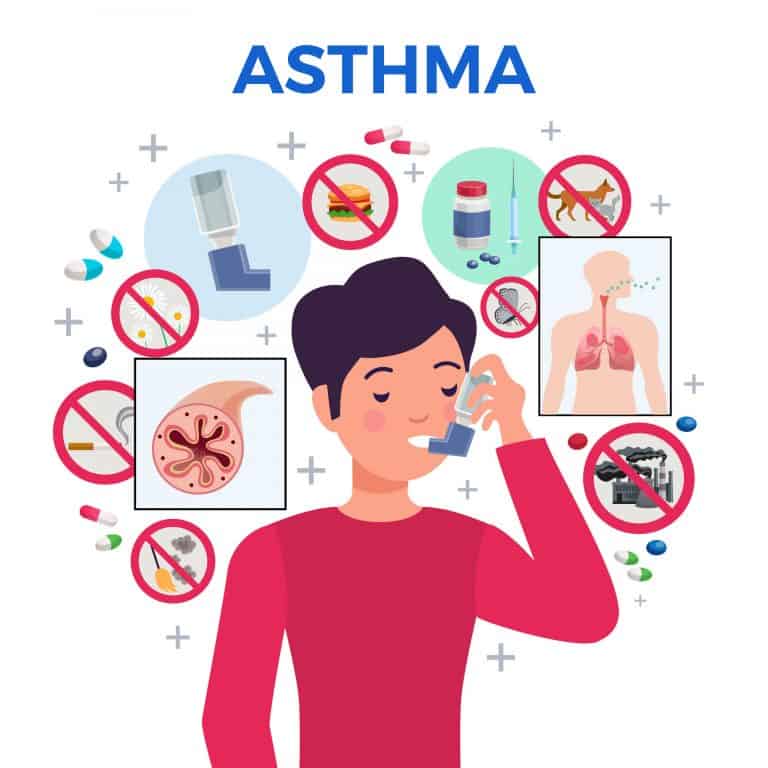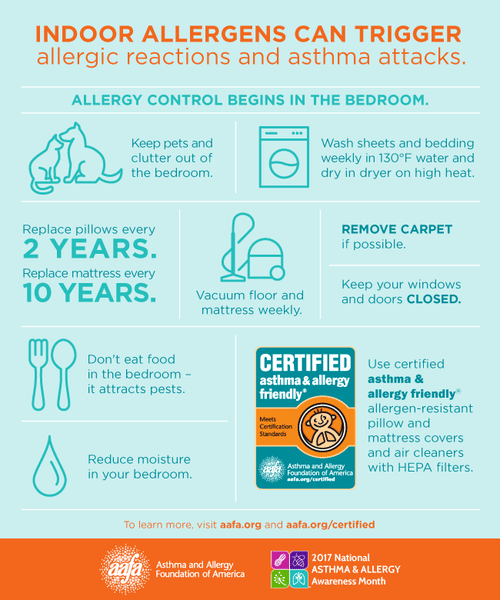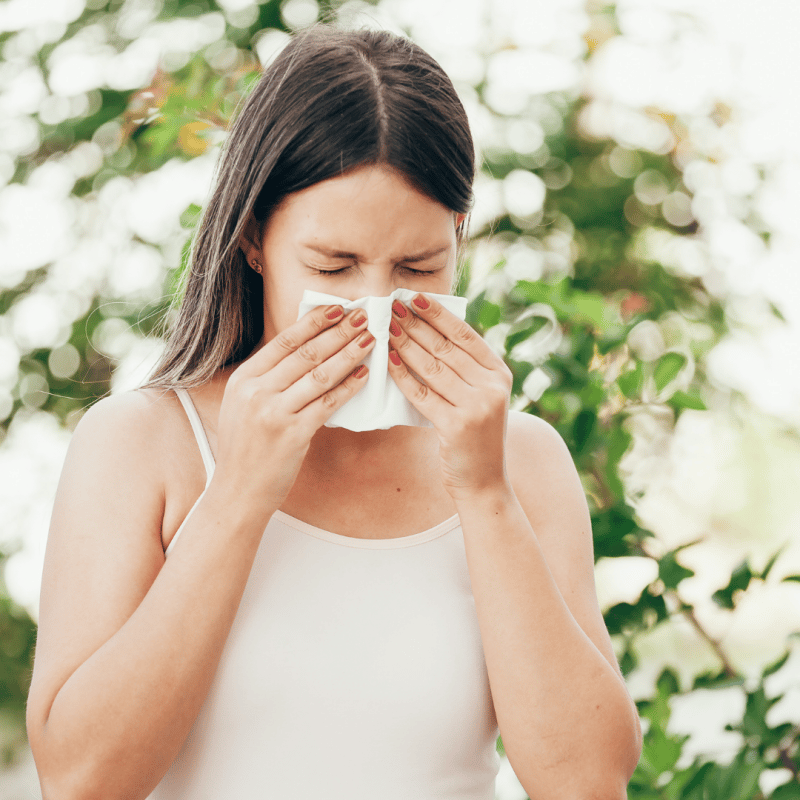Does Allergic Asthma Go Away
Some people think you can outgrow asthma, but this isnt really true. Asthma can cause airway remodeling, so even if your symptoms subside over time, you dont really outgrow it.
However, some people do outgrow certain allergies or rather their body doesnt have as strong of an allergic response. You may believe that your allergic asthma is going away, but think of it more like being in remission. Even after years without symptoms, an allergen exposure can trigger an allergic asthma attack.
Conversely, there is also increasing awareness that allergies and allergic asthma can develop in adulthood.
Is Allergic Asthma Dangerous
Allergic asthma, like any type of asthma, can be very dangerous and lead to an asthma attack. An asthma attack can happen when a trigger causes the lungs to become inflamed and swollen. Then the muscles around your breathing tubes tighten and spasm while more mucus than usual is produced. All these factors make the breathing tubes narrow and make it harder to get air into your lungs.
If you think you are experiencing an asthma attack, dial 9-1-1, use your quick-relief inhaler and seek urgent care.
Living with allergic asthma, you may feel frustrated or scared. This is normal. Asthma can be frightening but know that you can work with your doctor to develop a plan to treat both your asthma and your allergies. With treatment, you should be able to reduce the frequency and severity of your symptoms. Dont let your allergic asthma prevent you from living a happy, healthy life.
Developing An Asthma Action Plan
If you have asthma, its crucial to have a plan in place that helps you know what to do when you have a flare-up or experience symptoms. Your plan may include things like which medications to take, how to recognize when your symptoms worsen, and what to do in an emergency. If you dont already have an Asthma Action Plan in place, check out this plan from the Asthma and Allergy Foundation of America .
You May Like: How To Make Thyme Tea For Asthma
Medications For Allergic Asthma
Taking steps to control allergens is likely to improve your symptoms. But you may still need allergy and asthma medications to treat attacks.
Try nasal allergy medications that donât make you sleepy, saline rinses, and nasal sprays . If these donât work, use nasal steroid sprays and stronger antihistamines. If none of this helps, it may be time to talk to a doctor about allergy shots.
There are many good asthma treatments, but most require a prescription. These medications include inhaled steroids, which fight inflammation, and bronchodilators, which open up your airways. If traditional treatments donât help your allergic asthma, Xolair, an injectable medication that reduces IgE levels, may help. Also, the long-acting anticholinergic medication called tiotropium bromide may be used in addition to your regular maintenance medications to help with symptom control. This medication can be used by anyone ages 6 years and older.
Show Sources
SOURCES:American Academy of Asthma, Allergy, and Immunology: “What to expect at the doctor’s office,” “How to help your allergies and asthma,” “Allergic asthma information,” “Is your asthma allergic?” American Medical Association, Essential Guide to Asthma, 1998. National Heart, Lung and Blood Institute: “Asthma: How is Asthma Diagnosed?” “How is asthma treated?”Boehringer Ingelheim: “US FDA Expands Approval of Tiotropium Respimat® for Maintenance Treatment of Asthma in Children.”FDA. Prescribing Information: Spiriva Respimat.
Causes Of This Condition

There are many possible environmental causes of allergy induced asthma, and the allergens involved can be classified as indoor or outdoor. In the home, office buildings and industrial shops there are many substances that can trigger symptoms in those individuals suffering from allergy induced asthma. Indoor pollutants can come from fumes, cables, carpeting, cleaning products, disinfectant, paint, construction, and so on. Any of these pollutants can trigger congestion, runny nose, watery eyes, difficulty breathing and coughing. Research is finding that as more efficient homes and buildings are built, where there is less ventilation occurring within the structure, people are developing more sensitivities to indoor allergens.
Many environmental allergens are also found outdoors. These can include dust, fires, vehicle exhaust, insect stings, etc. These substances can trigger a reaction in individuals with allergy induced asthma. Some reactions can be extreme, as in the case with a bee sting, where immediate medical attention is required to enable an individual to normal, independent breathing.
Regarding heredity, it is noteworthy that having a parent with asthma will not guarantee that their child will also have the condition. Rather, an individual may inherit the tendency toward the condition, but not the condition itself. In general it is estimated that approximately two thirds of people with asthma will have a close relative with the same condition.
Recommended Reading: Which Is The Strongest Predisposing Factor For Asthma
Double Trouble: Understanding The Connection Between Allergies And Asthma
by Nicole Hoffman | May 31, 2019 | Allergies |
You may be surprised to know that allergies and asthma often go hand in hand. Both of them can be triggered by substances like pet fur, pollen or dust mites, and cause similar symptoms. In some people, skin or food allergies can cause asthmatic symptoms we call this allergy-induced asthma or allergic asthma.
Recommended Reading: Propranolol Weight Gain
How Is Climate Change Affecting Pollen Levels
Our changing climate has caused shifts in precipitation patterns, more frost-free days, warmer seasonal air temperatures, and more carbon dioxide in the atmosphere. These changes can affect:
- when the pollen season starts and ends and how long it lasts each year,
- how much pollen plants create and how much is in the air, and
- how pollen affects human health.
Some of these changes in pollen due to climate change could have major impacts on human health such as increasing individuals exposure to pollen and their risk of having allergy and/or asthma symptoms.
Links with this icon indicate that you are leaving the CDC website.
- The Centers for Disease Control and Prevention cannot attest to the accuracy of a non-federal website.
- Linking to a non-federal website does not constitute an endorsement by CDC or any of its employees of the sponsors or the information and products presented on the website.
- You will be subject to the destination websiteâs privacy policy when you follow the link.
- CDC is not responsible for Section 508 compliance on other federal or private website.
You May Like: How Do Doctors Check For Asthma
Are All Asthma Symptoms Caused By Allergies
No. While a strong connection exists, other triggers can lead to asthma attacks such as strong odors, exercise, cold air, and other respiratory infections. Many people suffering from asthma have more than one trigger. The best way to manage symptoms is to be aware of the triggers and pay close attention as they may change over time.
Asthma And Pet Allergies
People talk about an allergy to dog hair or cat hair, but the real culprit is dander. These flakes of skin that come off your pet can cause an allergic reaction. The proteins in your animals urine, faeces, saliva or feathers can also do this.
There are a few things you can try to help:
- Keep your pet outside as much as possible, and out of your bedroom
- Ask someone else to bathe and groom your pet
- Cleaned your pets bed or cage regularly, as well as any soft furniture they spend time on.
If you think youre allergic to an animal, ask your doctor to order or refer you for an allergy test so you can be sure. If you are allergic, your doctor or nurse can incorporate management tips into your asthma plan.
Theres more detail on managing the symptoms, testing and reducing your exposure, in our information on pet allergies.
Also Check: Natural Ways To Manage Asthma
Whether Its Asthma Allergies Or Both These Conditions Can Be Managed
With the right care and treatment plan, you can help your child manage their asthma, allergies or both so they can live a happy, healthy life.
If your child has never been diagnosed with asthma, allergies or is starting to show new symptoms make a primary care appointment. There are many conditions that look similar and your doctor can help demine if your childs symptoms are related to asthma, allergies or COVID-19, or something else.
With in-person and video visit options, you can choose the appointment type thats most convenient for you.
If your child has been diagnosed with asthma, allergies or both, you can schedule a visit with an allergy and asthma specialist without a referral.
Schedule An Appointment With An Allergy Specialist
Congestion, wheezing, runny nose, and other symptoms dont have to keep interrupting your daily life. Allergists like Dr. Sami Nallamshetty at Florida Medical Clinic can help diagnose the causes of your allergies and help get your asthma under control year-round using treatments like allergy shots, medications, and more.
Recommended Reading: What Causes Adult Onset Asthma
Relieving Your Allergy And Asthma Symptoms At Allergy Institute Pc
If you believe you may have allergic asthma, it’s essential to work with us to develop a treatment plan that’s right for you. Our goal is to assist you in managing your symptoms so you can maintain a healthy, active lifestyle!
At Allergy Institute PC, we offer a variety of treatments for allergies and asthma. Contact us online or call 619-5179 to get in touch with our team regarding your allergy or asthma diagnosis and treatment today.
We will work with you to provide services that will bring you long-lasting relief. Throughout the process, we will inform and guide you through your conditions and all available treatment options. Let’s make your life better one breath at a time!
Categories
What Does Allergic Asthma Feel Like

Distinguishing between non-allergic vs. allergic asthma can be challenging. This is because the asthma symptoms remain the same cough, wheezing, chest tightness, shortness of breath. The major difference is people with allergic asthma normally experience symptoms after inhaling an allergen. They may also experience other non-respiratory allergy symptoms such as hives on the skin.
Does an asthma attack triggered by allergies feel different than a typical asthma attack? No, there is not really any difference between the two. But if you know you have allergic asthma, you may be able to predict when you may be most at risk for an attack. By knowing what triggers your asthma, you can be extra cautious if exposed.
Don’t Miss: Is Arizona Good For Asthma
How To Manage The Impact Of Pollen On Your Asthma
If your asthma seems to be triggered by pollen, you can try the following measures to reduce your pollen exposure however, research has not yet shown whether this approach effectively controls asthma symptoms.
Several strategies that dont involve avoiding pollen may also be helpful.
- Make sure your asthma is as well controlled as possible by seeing your doctor before the pollen season gets under way. Ask about adjusting your preventive medicine for the likely increased exposure you will have to pollens over the coming months.
- Also ask your doctor about having your pollen allergy confirmed with a skin-prick test or blood tests.
- Monitor your asthma control, and follow your asthma action plan to adjust your medicine as instructed when your asthma control drops.
- If you have both asthma and hay fever, ask your doctor about treatments for hay fever that may help improve asthma control.
- Immunotherapy may be a possibility for some people with pollen allergy ask your doctor.
References
Asthma & Hayfever: Pollen Tracker
LeinsterMunsterConnachtUlster
Mainly a low risk for weed pollen today and a moderate risk thereafter in some spots during good weather. The spore risk will be moderate to high. All allergens will be low on the eastern coasts due to onshore winds.
The Asthma Society of Ireland Hayfever Campaign is kindly supported by ALK. As part of the campaign, the Asthma Society pollen tracker will provide daily updates on pollen levels around Ireland including regional prediction levels for the current and following day.
Pollen Season runs from now until September, and people with asthma are advised to ensure their asthma and hayfever are well managed. The pollen tracker can help people to recognise the days when they need to take additional precautions to manage their asthma and hayfever.
Our Pollen Tacker will run from April 2021 to August 2021.
Check here daily for your pollen count update!
Our pollen tracker updates daily showing the pollen levels across the 4 provinces. It is important to check the tracker each day to best manage your asthma and hay fever.
Up to 80% of people with asthma also have hayfever. If you would like advice on how to avoid allergy triggers and cope with allergic rhinitis please contact our Asthma Adviceline on 1800 44 54 64. You can also now use our new free Beating Breathlessness WhatsApp patient support service. For more information click here.
Our Pollen Tracker service is kindly supported byALK.
Don’t Miss: Common Symptoms Of Asthma Are
What Is An Allergy
Your immune systemâs job is to protect you from bacteria and viruses. If you have allergies, though, part of your immune system works too hard. It may attack harmless substances — like cat dander or pollen — in your nose, lungs, eyes, and under your skin.
When your body meets an allergen, it makes chemicals called IgE antibodies. They cause the release of chemicals like histamine, which cause swelling and inflammation. This creates familiar symptoms like a runny nose, itchy eyes, and sneezing as your body tries to remove the allergen.
Allergic Asthma: Symptoms And Treatment
Ashley A. Sullivan, MSN FNPStudent, Samuel Merritt University, Oakland, CaRN, California Pacific Medical Center
Natalya M. Kushnir, MDDirector, Allergy and immunology Clinic of East BayBerkeley, CA
H. Henry Li, MD, PhDFAAAAI, FACAAIInstitute for Asthma and AllergyWheaton and Chevy Chase Maryland
Michael A. Kaliner, MD FAAAAIMedical Director, Institute for Asthma and AllergyChevy Chase and Wheaton, MarylandProfessor of Medicine, George Washington University School of MedicineWashington DC
You May Like: Ways To Help Asthma Without Inhaler
Recommended Reading: How Often Can You Use A Rescue Inhaler For Asthma
Do Allergy Seasons Really Vary In Intensity From Year To Year
Many doctors and scientists say allergy seasons are intensifying, starting earlier and lasting longer. Climate change is a factor. Its fueled in part by rising temperatures and mild winters, allowing pollen-producing trees and grass to bloom earlier. The extended growing seasons leads to increased levels of airborne allergens.
In addition, snowmelt in late winter or early spring can increase moisture that allows trees to produce more pollen when they bloom.
Can Allergic Rhinitis Make Asthma Worse
Hay fever can make asthma harder to control. People with asthma who also have allergic rhinitis have more visits to hospital or emergency departments and more time off work or school than other people with asthma.
Some people find that the things that trigger their asthma will also make their allergic rhinitis worse. These could include things they are allergic to or cold air, cigarette smoke or other irritating fumes.
Effective treatment for allergic rhinitis may reduce the chance of severe asthma attacks, and make the lungs work better.
People with allergic rhinitis who are allergic to grass pollens can have asthma attacks caused by springtime thunderstorms. These mainly occur in October-November, in places where there is a lot of grass pollen . Very severe asthma attacks triggered by thunderstorms are more likely in people who have asthma as well as allergic rhinitis especially if their asthma is not well controlled, or they are not taking regular preventer medication for their asthma.
Also Check: Does Asthma Get Worse At Night
What Are The Common Triggers Of Allergic Asthma
Learning to avoid your allergens is key to managing your allergic asthma. Find out how to avoid these common allergens:
These spider-like creatures are too small to see with the naked eye. They feed on human skin flakes. Both the body parts and feces of dust mites are considered allergens. They are found in mattresses, pillows, carpets, upholstered furniture, bedcovers, clothes, stuffed toys, fabric, etc.
Molds can grow on almost anything when moisture is present. Outdoors, many molds live in soil, or on leaves, wood, and other plant debris. Indoors, they can be found in a damp basement, near a leaky faucet or pipe, or a wet shower stall or bathtub. Molds produce tiny spores, which are like seeds, to reproduce. These spores become airborne easily.
Pet urine, feces, saliva, hair or dander are all allergens. But you don’t have to have pets in your house or visit places where animals are kept in order to be exposed to their allergens. Animal allergens are often detected in places where no animals live. People who own or have been around animals may have carried the allergens into the place.
Treating Allergies Vs Treating Asthma

In both cases, its important to recognize what triggers the reactions. If you have asthma, you may be triggered by dust, pet dander, or mold. Similar things can trigger allergies, and may change with the seasons.
Allergies can be treated with allergy shots. These shots treat allergies by gradually lessening your immune-system response to certain allergic triggers. The shots work by using a method of treatment known as immunotherapy, which introduces a small dose of allergens into your system over time. This helps your immune system build up a tolerance to the allergens over time, thereby lessening symptoms.
Asthma can be treated with medications that are administered through an inhaler, which takes the medication directly into your lungs and airways where the allergic reactions occur. These inhalers are particularly helpful as they are quick acting in cases of emergencies like asthma attacks.
You May Like: Can Asthma Cause Back Pain
